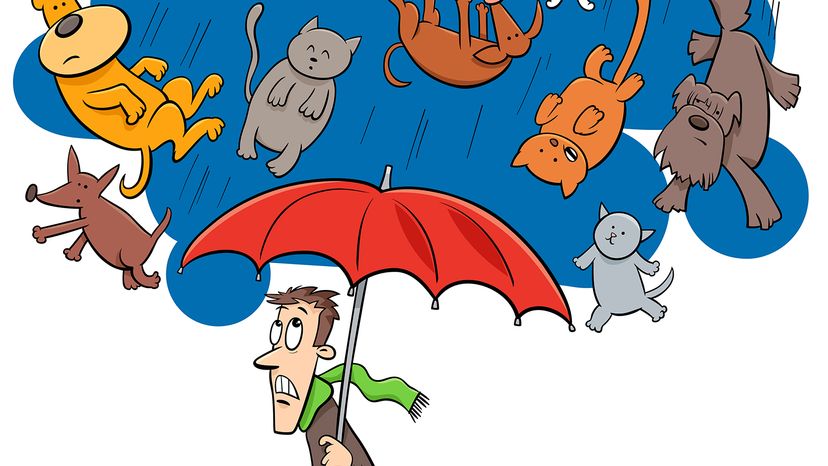
Hyperbole is an ancient Greek word that roughly translates to "go beyond." The many hyperbole examples you find in everyday speech align with this idea of going further than the truth to drive a point home.
Advertisement

Hyperbole is an ancient Greek word that roughly translates to "go beyond." The many hyperbole examples you find in everyday speech align with this idea of going further than the truth to drive a point home.
Advertisement
Hyperbole is a common figure of speech or literary device (when written in literature and poetry) that paints a vivid picture of an extreme feeling or image. You may have heard someone use the common statement, "I'm so hungry, I could eat a horse," knowing that neither of you could actually eat an entire horse.
You know how large a horse is, so you can have a sense of how hungry you would need to feel to consume such a large animal. That is the root of hyperbole: It is an unrealistic extreme that evokes a unique response.
Advertisement
The same concept applies to writers trying to portray some sense of the world they're creating for their readers. When they describe a person, they may latch on to a dominant quality and exaggerate to highlight uniqueness. For instance, when describing an abnormally tall person, they may write that they are "taller than a tree."
Whether spoken or written, the goal of bringing attention to something by using an unrealistic comparison is an effective use of language.
Advertisement
Using figurative language is an excellent way to emphasize a point in everyday conversations or give ideas more meaning and substance when writing a story. However, extravagant exaggeration is best used in moderation to effectively pack the most punch.
Using an exaggerated statement too frequently can cause it to lose its original definition. In breaking this connection, you will likely fail to put extra emphasis on the original thought. The most useful strategy is to save hyperbole for special occasions and rely on simile and metaphor in most cases.
Advertisement
The following phrases are some of the most common hyperbole examples in the English language.
Although people do eat horse meat in some parts of the world, the phrase is used to emphasize a point of hunger when someone feels they could consume a gigantic animal. The example is obviously hyperbole because even the largest person couldn't feast on a thousand pounds of meat in one sitting.
Advertisement
It probably feels like you've heard people use "million" more than a million times to describe amounts that are much less than the seven-figure mark. "I have a million questions" or "I have a million things to do" are some of the most common expressions for generally confused or busy people.
A million is such a large number that it is often an easier figure of speech to use than a more complex simile or metaphor. For example, "We've been waiting in this line for a million years" is an effective way to emphasize time, even if you have been waiting for just a few hours.
The imperial measurement, equal to 2,000 pounds (907 kg), is one of the most common examples of hyperbole, which expresses an excess amount of weight or numbers. For instance, you have probably heard the expressions, "This bag weighs a ton" or "My band has a ton of fans."
The world has experienced a wide range of strange weather phenomena, but the expression "raining cats and dogs" is a bit of a stretch. Fish, maybe, but never beloved furry pets.
Long before Justin Timberlake's 2002 hit of the same name, "cry me a river" was already a common phrase used to mock someone who was feeling dramatic and offended. Even during the worst day of your life, you would never be physically able to create your own personal waterway from tears.
Advertisement
Writers trying to craft the next great American novel can take notes from some of these examples of hyperbole found in famous books and poems.
Auden masterfully uses exaggerated statements to describe a great love when he writes:
Advertisement
These examples claim more meaning because their absurdity tells the story that this love will last forever.
Mark Twain was a 19th-century humorist who used everyday language to capture the authentic feeling of youthful adventure in one of his most famous novels, "Huckleberry Finn" (1884). The story of Huck Finn tackles issues of slavery in the U.S. from the point of view of a runaway slave named Jim.
Speaking on slavery, Jim claims that he felt "trembly and feverish to be so close to freedom." Jim is not literally experiencing these maladies, but they illustrate his excitement for a new life away from the torture and toil of living as a slave in the South.
Harper Lee used hyperbole to craft the setting in this award-winning classic when she wrote: "A day was twenty-four hours long but seemed longer. There was no hurry, for there was nowhere to go, nothing to buy and no money to buy it with, nothing to see outside the boundaries of Maycomb County."
Shel Silverstein is a staple of any elementary school library, and his famous children's books are gold mines of some of the best examples of hyperbole in poetry. The main character in "Sick" (1993) is a young girl who is trying to skip school due to her many exaggerated illnesses. Peggy Ann McKay complains:
No list of hyperbole in literature would be complete without mentioning the man responsible for shaking the very foundations of the English language. In Shakespeare's "Macbeth" (1623), Macbeth feels remorse for committing murder, asking, "Will all great Neptune’s ocean wash this blood clean from my hand?"
Advertisement
Please copy/paste the following text to properly cite this HowStuffWorks.com article:
Advertisement